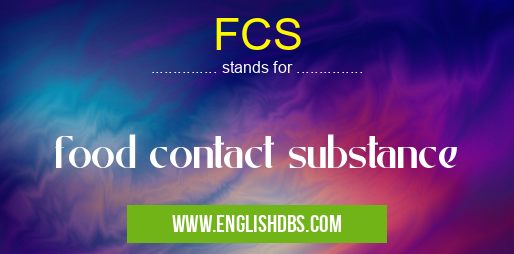What does FCS mean in US GOVERNMENT
Food Contact Substance (FCS) is the term used by governments around the world to denote any material or substance that may come into direct contact with food. In this context, FCS refers to all materials or substances used in the production, storage, handling, transport and consumption of food. The use of FCSs is regulated globally to ensure that it does not present any health risks for consumers.

FCS meaning in US Government in Governmental
FCS mostly used in an acronym US Government in Category Governmental that means food contact substance
Shorthand: FCS,
Full Form: food contact substance
For more information of "food contact substance", see the section below.
What Does FCS Mean in Governmental Regulations?
FCS stands for Food Contact Substance as defined by various governmental regulations. Under these regulations, Food Contact Substances are further divided into two categories: materials and additives that are intended to be part of the product consumed, and those which are incidental or non-intentionally added during processing, packaging or storage. For example: packaging materials such as plastics or paperboard may fall under the FCS category. Likewise, compounds and agents used as preservatives or shelf-life enhancers may also fall under this category; even if they are only present in very small amounts and do not have any discernible impact on the nutritional value of the food itself. Governmental regulation of FCSs is aimed at ensuring that no hazardous chemicals can enter into our food chain via their usage. Generally speaking, all additives must be approved by government bodies prior to their use in food contact applications - whether they are natural or synthetic compounds - and manufacturers must provide written evidence showing that their products comply with established safety standards before being allowed onto market shelves.
Essential Questions and Answers on food contact substance in "GOVERNMENTAL»USGOV"
What is FCS?
FCS stands for Food Contact Substance, which are materials used to package, store and process food. These substances can range from plastic packaging to the coatings on baking trays.
Why are FCS important?
FCS are important because they protect food from bacteria, contamination and spoilage. They also help maintain the nutritional value of the food by preventing oxidation or other damage.
What kinds of materials can be considered FCS?
Any material that regularly comes into contact with food can potentially be considered a Food Contact Substance. This includes coatings, binders, adhesives, paper and cardboard packaging, storage containers and various plastics.
Are there any regulations for FCS?
Yes, all countries have specific regulations that govern what materials can be used as a Food Contact Substance and how these substances must be tested to ensure safety.
Does FCS have an effect on taste?
Generally speaking, no. Food-grade materials used for packaging will not affect the taste of your food in any way.
Do I need to follow certain guidelines when using FCS?
Yes, you should adhere to all applicable regulations when using any material as a Food Contact Substance in order to ensure safety and quality standards are met. Additionally, proper hygiene practices should always be followed when handling any food-related product.
Is it safe to reuse FCS?
It's generally not recommended to reuse Food Contact Substances since there may be a risk of contamination if they've come into contact with bacteria or other contaminants during their initial use. It's best practice to dispose of them properly after each use and replace with new materials whenever possible.
Are all types of plastic suitable for use as an FCS?
Not necessarily; different types of plastic have different properties that might make them unsuitable for certain applications (e.g., microwaveability or temperature resistance). Care should be taken when selecting which type of plastic is appropriate for which application as a Food Contact Substance in order to ensure proper performance and safety conditions are met.
Can I store hot liquids in an FCS container?
Yes; however, it's important to pick a container made out of suitable material if you plan on storing hot liquids in it over time as some materials may degrade more quickly under those circumstances than others do.
How often does an FCS need to be replaced?
Regular inspection and maintenance should always take place regardless of how often the material is being replaced since wear-and-tear or minor damage can occur even without visible signs being present on the surface level – this is especially true for items like storage containers that hold large volumes of liquid or semi-liquid products such as soups.
Final Words:
Food Contact Substances play an important role in ensuring a safe food supply for us all; providing assurance that all materials coming into contact with our food have been adequately tested, approved and regulated according to established safety standards before going out for public consumption. By regulating FCSs in this way we can be sure that only products deemed safe for human consumption are permitted on our marketplace shelves; protecting us from potentially harmful contaminants entering our intricate global food supply chains.
FCS also stands for: |
|
| All stands for FCS |
